 | « Back to article | Print this article |
The AIADMK is convinced that the BJP will remain an electoral burden for a long time to come, beginning the Lok Sabha polls next year, reveals N Sathiya Moorthy.
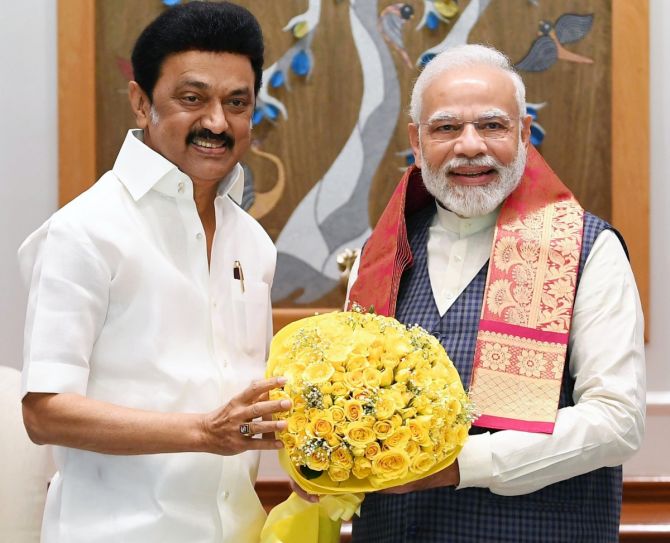
For an ambitious political party determined to disturb a stable politico-electoral system of decades in its favour, criticism from the rival, whether justified or otherwise, is all in a day's work.
But for the party to be rocked by an otherwise dependable ally, ahead of what some at least see as crucial parliamentary polls a year down the line, is a different thing altogether. It means that someone has got it all wrong.
At least this is what seems to have afflicted the Bharatiya Janata Party in Dravidian Tamil Nadu.
The ruling party at the Centre is getting it good not only from the ruling Dravida Munnetra Kazhagam, but also from the Opposition All India Anna DMK ally, that too by 'poaching' party office-bearers.
Something, to misquote the Bard, is rotten in the state of Tamil Nadu.
For the DMK, Chief Minister and party chief M K Stalin launched the attack personally, naming the BJP as the party behind the nation-wide social media campaign that a dozen 'migrant labour' from Bihar were killed by their Tamil colleagues in Tamil Nadu, no questions asked.
Clearly, the campaign was targeted at Bihar's RJD chief minister Tejashwi Yadav for sharing a dais with Stalin on the latter's birthday when fellow Biharis had allegedly been killed in a state under his care.
What made things worse -- and deep -- was that some otherwise accountable newspapers in the Hindi belt too sought to lend credibility to what was a total figment of somebody's imagination.
Both the DMK and the party-led state government were caught by surprise at the turn of events, but once shaken from their sleep they were quick to react.
The perpetrators, whoever they were, forgot that social media is a two-way street and can be put to positive use, as well.
Even without anyone asking or taking the initiative, it became clear in double-quick time that it was all fake news.
Verification Web sites like AltNews did the rest. That did 'em in, and the Tamil Nadu police is mopping up the rest, by filing criminal cases against many BJP leaders from the North, and has arrested some, for spreading not just rumours, but hatred, punishable under the Indian Penal Code.
From inside Tamil Nadu, the police filed a criminal case against state BJP chief K Annamalai, a Karnataka cadre IPS officer who quit the police service to jump into BJP politics in his native state, and become its head within months -- a rarity for any large party, national or regional.
The question now is if some of Annamalai's 'war-room' aides quitting the party hurriedly had anything to do with the police investigations, or if they (too?) were fed up by his tactics, citing which many others with a longer innings in the BJP, had quit -- or, were caused/forced to quit, as they claimed.
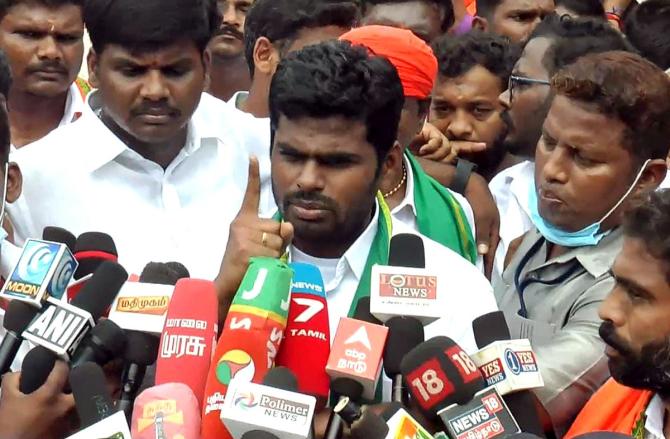
What surprised many even in the AIADMK and shocked BJP veterans was the way party's 'acting general secretary' and former chief minister Edappadi K Palaniswami admitted BJP state IT wing chief C T R Nirmal Kumar only hours after quitting the latter, blaming it all on Annamalai.
It was also a first for the AIADMK to admit a 'BJP rebel' under Annamalai's care.
This was followed by a few more publicised exits from the BJP's peripheral wings, but there is no knowing if EPS granted them all admittance, if sought.
The two parties have reportedly called a truce since, though it is not a patch-up in the traditional sense.
Both sides are simmering, and before the truce, second-line AIADMK faction leaders had begun defending Nirmal Kumar's entry or otherwise attacking Annamalai, as intermittently as they have been doing all along.
How it all plays up for the BJP in the parliamentary polls, starting with seats negotiations with the AIADMK ally, remains to be seen.
In the past, whenever the national party in power at the Centre had developed ambitions in Tamil Nadu, their state party chiefs especially would go hammer and tongs against their Dravidian friends and foes alike.
It used to be the Congress for most parts, and the BJP under the Vajpayee-Advani duo, 1998-2004.
Yet, around election time, the national party's high command would take stock, conclude that they did not have much hope still, and patch up with the estranged ally, by sending a Delhi team.
The state BJP chief became the sacrificial lamb at the altar of electoral expediency.
Does such a fate await Annamalai, too, is the unanswered question for now.
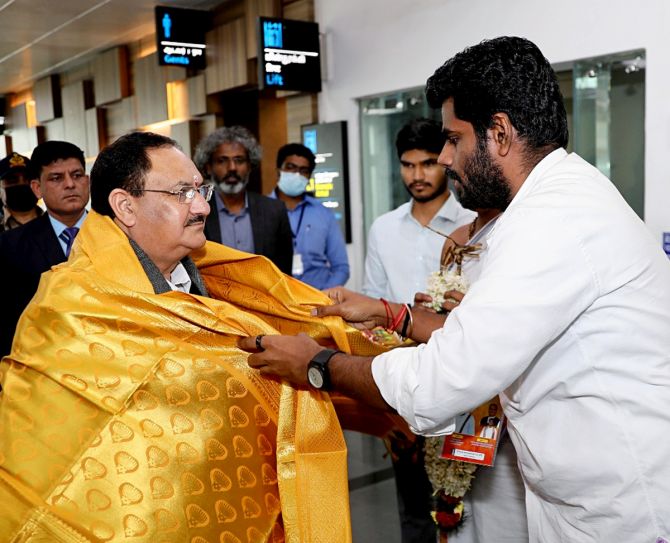
There is no denying that on both the DMK and AIADMK fronts, the BJP seems to have got it all wrong.
Whatever could be said about the Stalin leadership, he has been careful not to allow his party men to take pot-shots at the Modi government, which could later on become personal and uncontrollable.
Whatever needed saying, whether against the BJP or the party-led government at the Centre, he was doing it himself, or assigned the job to some senior leaders and ministers, who knew his mind and approach.
Hence, from an internal DMK perspective, for Stalin to name the BJP as the party behind the 'migrant labour rumours' is saying a lot.
He needed to say it, as an internal combustion was at work in the party, over this very issue.
He needed to calm them down, as otherwise, some loose talk could have emanated, whether on party platforms, or social media, or both.
To be precise, even in the controversies and ideological clashes involving Governor R N Ravi, who incidentally is another IPS veteran with a background in gathering intelligence, Stalin and the DMK have kept the BJP and Prime Minister Modi out of the reckoning.
Traditionally, under such circumstances, the Dravidian ruling party in the state would have casually charged the Centre with sending a 'hatchet man' to destabilise the Opposition-run government, a charge already being laid by Stalin's counterparts in other states against the BJP Centre.
Now, it may be a no-holds barred battle from the DMK side, though Stalin might still decide to confine all criticism of the BJP to the top layers of the party leadership, thus ensuring a certain degree of decorum and dignity that used to be missing in lower-level spats between political rivals, and not just in Tamil Nadu.
In particular, he seems to have been perturbed at the way the BJP units in northern states 'conspired' against the DMK and Tamil Nadu, after he had organised an anti-BJP rally in Chennai on his birthday and declared that the party needed to be defeated and there can be no coalition for this, minus his Congress ally in Tamil Nadu.
The 'inevitable conclusion' is that the perpetrators in Bihar and UP would not have done it without the knowledge, if not instigation, of their own state leaders, who in turn might have kept the high command in the loop, one way or the other.
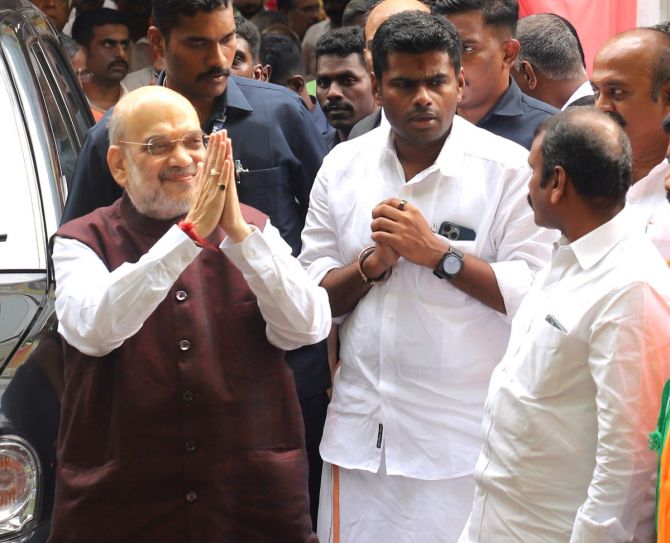
Independent of they being wedded to the BJP's Hindutva ideology lately, non-RSS converts to the party and other 'Modi bhakts' of the past years feel let down by the party not being able to deny the state government's charges against north Indian units on the 'migrant labour rumours'.
They also look askance at the idea of BJP President J P Nadda inaugurating 10 district unit buildings for the party at a function in Krishnagiri, in the midst of the migrant labour controversy.
More so, they are upset, asking themselves the inevitable question as to where from did the BJP get the kind of funds required to build party offices in districts, with Nadda promising more in the state and elsewhere in the country.
What is more, unlike earlier, Stalin has since publicly condemned the detention of Delhi's then deputy chief minister Manish Sisodia despite the latter's AAP being at loggerheads with the DMK's Congress ally.
Later, he also reiterated his birthday resolve, in clearer terms, on his efforts to work for an anti-BJP 'secular' Opposition front at the national-level.
Critics on social media claim that it all owed to the fear of anticipated raids and arrests involving his ministers and other party colleagues for alleged violations of law.
On the AIADMK front, it was an 'arrival statement' for EPS, like his mentor J Jayalalithaa had done before him.
Barring DMK founder C N Annadurai, who died relatively young in office, and also AIADMK founder MGR, both Muthuvel Karunanidhi and Jayalalithaa as leaders of the two parties and chief ministers in their first innings, started targeting the ruling party at the Centre (an ally otherwise), once they had settled down in office and had gained the confidence to call the other party's 'bluff'.
EPS has now done it with a difference.
He has done so when still in the Opposition, and his leadership of the party is still in legal question before the Supreme Court and lower judicial fora, in cases initiated by his group or the rival faction identified with three-term chief minister O Panneerselvam.
EPS has gone one up in that he has 'rebelled' against a much stronger and more determined BJP ally at the Centre when his party's stars still down, as reflected in losing the Erode East assembly by-polls.
Despite social media criticism about DMK ministers in charge of the Congress ally's by-poll campaign, allegedly spending hundreds of crores of rupees, AIADMK cadres are convinced (and rightly so?) that the huge margin at least owed it to the 'minorities', who constituted the second highest vote-bank.
This has revived their memories of the near-washout in the 2019 Lok Sabha polls and a creditable defeat in the assembly elections two years hence, in 2021.
Unmentioned in public as yet, the AIADMK is convinced that the BJP will remain an electoral burden for a long time to come, beginning the Lok Sabha polls next year.
At the higher-level, EPS and the rest are peeved at Annamalai and his predecessor L Murugan, now Ua nion minister, trying to make political hay when they were busy battling one another for over six years since Jayalalithaa's death in December 2016.
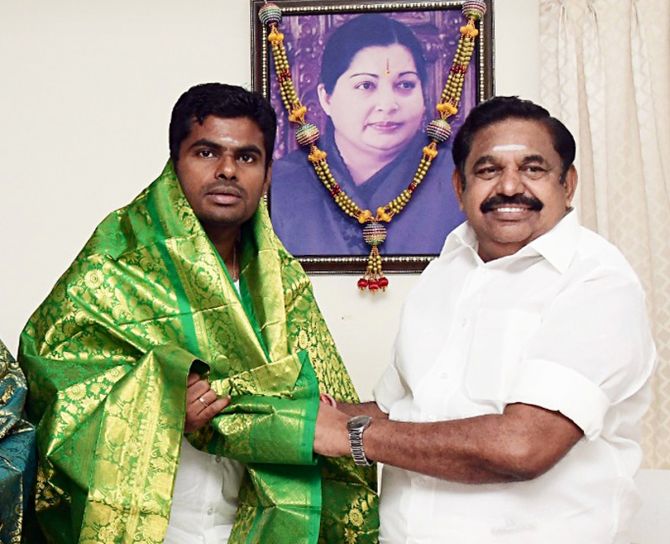
These are the twin messages on the wall that the BJP high command has failed to read ever since Jayalalithaa was hospitalised in September 2016, not long after leading the AIADMK to a second time victory in a row, in the assembly polls that very year.
They need to acknowledge that their 'intellectual advisors' from the state and outside have been wide of the mark as always, and their elite middle-class support base has inherent limitations expanding beyond the traditional 2-3 per cent vote-share.
The reasons are not far to seek. Religious issues that the BJP social media, both official and otherwise, continues to flag have never ever been an electoral consideration for the majority Hindus in Tamil Nadu while it has been a defining factor for the state's minorities as elsewhere.
In recent decades, there are DMK cadres who are as religious as ever, and they don't shy away from wearing their religion too on their sleeves -- as any other. The BJP refuses to understand.
Two, on the alliance front, the BJP high command either does not know the Dravidian past, or hopes to change the discourse as it (alone) knows.
It tends to forget that the Dravidian discourse has not changed, and is incapable of changing in a single generation, to say the least.
Hence, for the party leadership to continue enjoying the loyalty of cadres, old and new, they need to be strong and be seen as being strong -- as much against the political rival as the national ally/allies. They cannot afford to do it otherwise.
It is thus that Nadda was still wide of the track when he said in Krishnagiri that the era of 'dynastic regional parties' are all over.
He may be targeting the DMK, where Stalin succeeded his late father Karunanidhi, and minister-son Udayanidhi is ready to step into his father's shoes in his own time.
But national parties, led and misled by the national media, and vice versa, are incapable of understanding that there is more to regional politics, particularly of the Dravidian variety, than the DMK's 'dynastic politics'.
What Nadda and the Modi-Shah leadership too seem to have forgotten is that the AIADMK, after all, is not dynastic since inception and was founded as an antithesis to the same in the DMK under Karunanidhi, who was promoting his first-born and little-known Mu Ka Muthu, against MGR in the Tamil filmdom of the early seventies.
If they decide to part company, then the AIADMK would be the electoral beneficiary of the BJP's campaign, too, even as the party itself continue to campaign on the DMK-run state government's 'administrative failures and political missteps'.
N Sathiya Moorthy, veteran journalist and author, is a Chennai-based policy analyst and political commentator.
Feature Presentation: Rajesh Alva/Rediff.com